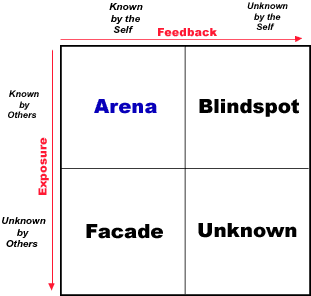I was recently talking-to my friend Robert (not his real name) and asking him whether it’s worth inviting Rick (not his real name either) to speak at an upcoming reference.
Robert said, “Yes..if you think it’s a good idea”
That did not seem like a glowing endorsement.
Rather than reading in-between lines, I asked Robert if I was missing anything important.
Robert calmly said, “Raj, if you have read Adam Grant’s book on Givers and Takers, you know that there are three kinds of people – Givers, Matchers and Takers. Rick is a Taker. Just factor that in your decision-making. If you ignore that or it doesn’t matter to you, he is a good choice.”
I nodded and struck Rick’s name in the list.
You see, the not-so-fine-print for people hurts them, but only indirectly.
The Blindspot
Please see the Johari Window (shown below). The not-so-fine-print I was referring to broadly can be categorized as the “Blindspot” in the Johari Window (known to others, not known to self)
HT: Joseph Prabhakar
The blind spot can be in the area of strengths are in the area of weaknesses.
Both hurt.
If it is in the area of your strengths, it hurts because without being aware of the strengths, you may not consciously work on nurturing those strengths.
If it is in the area of your weaknesses, it hurts because the news spreads in your extended networks and you lose opportunities prematurely and the worst part is that you won’t even know you lost them.
Feedback Version 1: Cop out (a.k.a Self-Esteem Booster of the wrong kind)
If the problem is that you need to discover what others know (but, you don’t) about you, the solution seems to be simply to ask people to tell you what they see.
Well, there are two problems on that front
A. There is no upside for others to tell you unless they are very close to you AND they know that you are going to take the message in the right spirit.
The second problem is even bigger
B. How you asked for feedback. For example, the cop out method will be to post a message on a social network to ask all your friends to provide three keywords that come to their mind when they think about you. As to be expected, you will receive a collection of keywords that will make you or anyone else feel like a King or a Queen.
The better method is below:
Feedback Version 2: Reality Check (a.k.a Looking at the Mirror the right way)
You can get the real feedback from the following sets of people:
- Mentors (the agenda for good mentors is to help you become a better version of you)
- Competent Inner Circle Members (because they care)
- Good Therapists (yes, they can help as well)
The important things to know before you even seek out feedback is that:
- You need to be open and willing to do something about the feedback
- You need to be vulnerable
- You need to be humble
In this variation of the feedback, you change the question to “What three negative keywords come to your mind when you think of me?”
When I did a mini-exercise with this version of the feedback, I got some results that were expected, but hoping that I won’t hear those results back. But, some were surprising eye-openers. I won’t write all the negative keywords because reading them back will re-activate the pain. Needless to say, I have some (understatement, of course) work to do.
The truth about you is out there. It’s better that you learn about that too.

